Tag: HVAC career
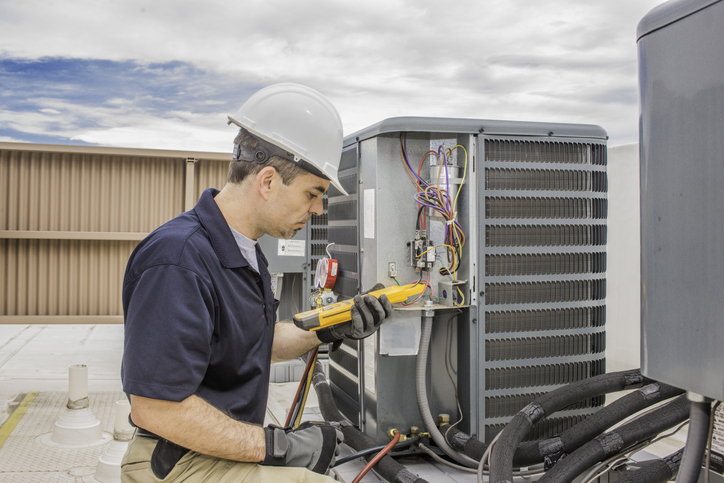
As summer approaches, an air conditioner becomes one of the most essential home appliances. In order to keep cool in hot temperatures, people rely on their AC unit to deliver cold air right into their homes. But what happens when this appliance starts to leak? It’s not uncommon for an air conditioner to develop such a problem over time–especially if it hasn’t been properly maintained or is being used constantly. Air conditioner leakage can occur for a variety of reasons, but the good news is that a leak can almost always be fixed.
If you’re considering a career as an HVAC technician, knowing the most common culprits behind a leak can help you to quickly identify the source of a client’s problem: quickly restoring the flow of cool air within their homes!
Read on to discover six common causes of air conditioner leakage.
1. During Your HVAC Career, Be Aware That a Broken Pump May Cause a Leak
Within an air conditioner unit, the condensation pump is a device that serves to drain water in order to prevent a leak. However, this pump can actually cause a leak if it isn’t working properly. Most pumps are equipped with a float switch, which will turn on when the water gets to a certain level. If this switch has become stuck due to a buildup of debris or scum, it might not work. This lack of functioning can in turn result in dripping water from the unit. If you come across such a situation in your HVAC career, you can try cleaning the switch with bleach. If it still doesn’t turn on, chances are the pump needs replacing.
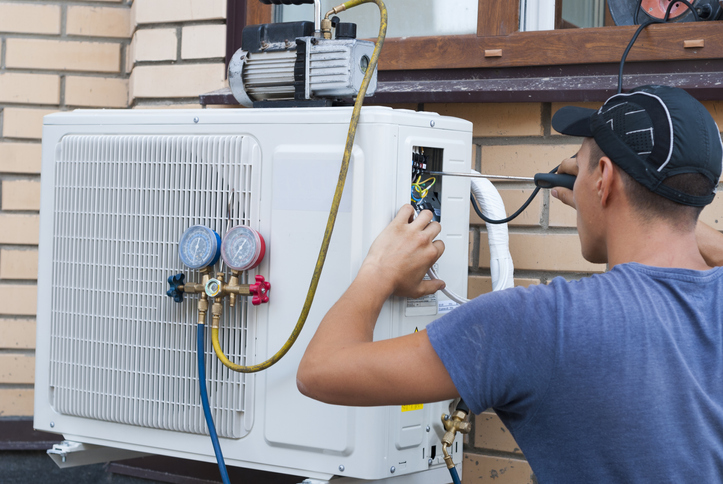
2. Drain Pan Issues Can Cause Leakage
Located beneath the indoor air handler, the drain pan functions as a trap for condensation created by the air conditioner. It connects to a drain pipe, which transfers the condensate outside to prevent moisture buildup around the unit. If the drain pan is rusting, cracked, or overflowing, this is likely to lead to a leak problem. Check the drain pan for leaks by turning off the AC unit and inspecting the pan for signs of rust, cracks, or debris buildup. If the drain pan is the culprit, this component of the air conditioner can easily be replaced.
3. If the Evaporator Coils Are Frozen, Leaking Will Follow
Evaporator coils can be found inside the door of the air conditioner unit. Refrigerant flows through these coils to deliver cool air through the vents. But if the evaporator coils freeze, ice will form and create a leak. These coils may freeze due to restricted air flow, a buildup of dirt or debris, blocked vents, or a lack of refrigerant. When you become an HVAC technician, you can identify frozen evaporator coils by checking whether there is ice or frost within the unit. From there, you can determine the source of the problem by checking the refrigerant levels, filter, vents, and other components to ensure that air is moving properly through the coils.
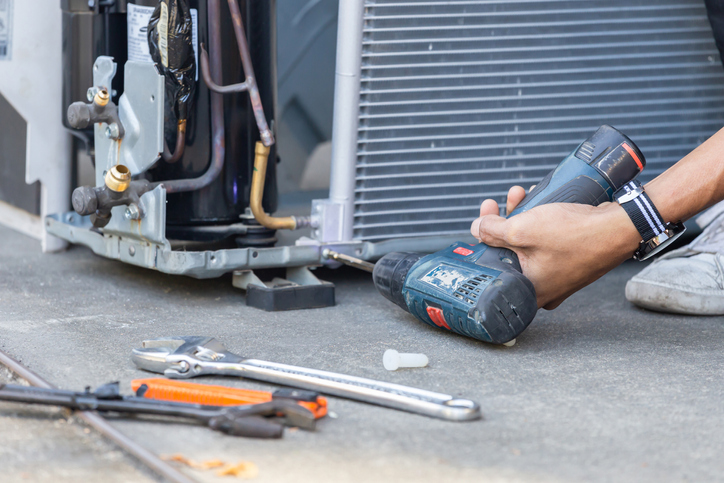
4. An Air Leak is One of the Most Common Problems
When an air leak occurs, air escapes around the vents of the air conditioner rather than through the designated path. This air flow can cause condensation to appear where it shouldn’t, leading to dripping from the AC unit. Air leaks can happen over time if a unit isn’t properly maintained. The good news is they can typically be fixed, simply with caulk, by sealing up the sides of the vent where air is escaping.
5. Look Out for a Blocked Condensation Drain Line
The condensation drain line attaches to the drain pan to transfer condensation outside–preventing leakage from occurring indoors. Over time, the drain line can accumulate debris or be exposed to algae or fungi growth. If the drip pan is overflowing but intact, it’s likely that the source of the leak is a clogged condensation drain line. Luckily, a blockage can typically be fixed by clearing the drain line using vinegar or another solution.
These are just some of the sources of leakage in a home’s AC unit. During your HVAC career, you can refer to these common underlying issues as possible causes when it comes to developing a solution for a client’s leaking air conditioner.
Are you interested in attending HVAC school?
Explore programs with NATS to launch your career today!
HVAC & The Environment: What You Should Know If You’re Pursuing an HVAC Career
March 10, 2021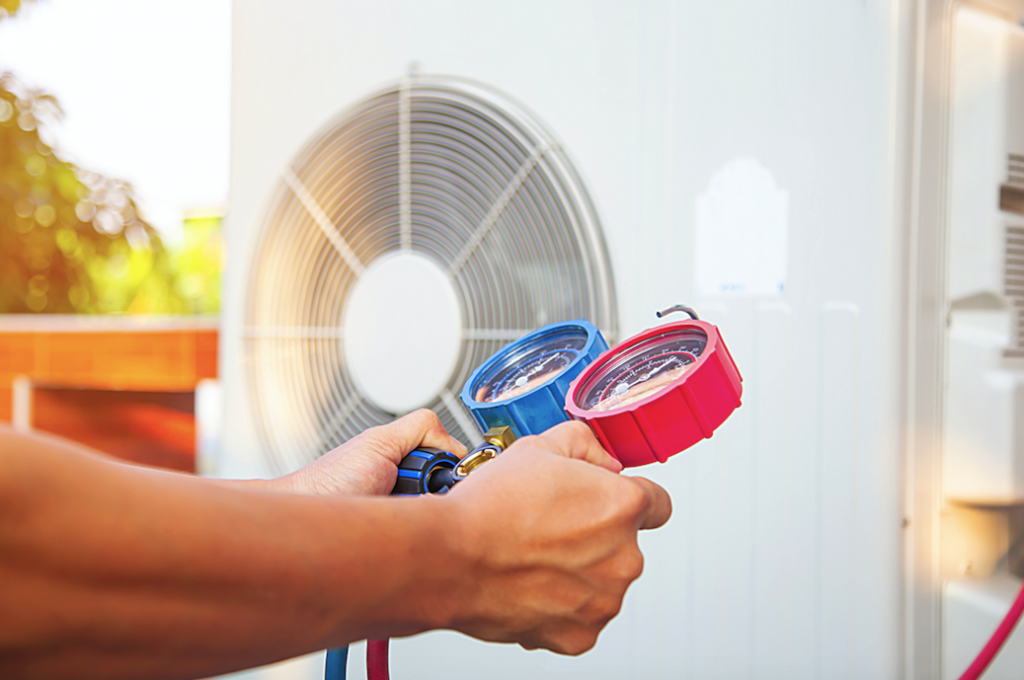
Heating, ventilation and air conditioning (HVAC) systems have an essential function. They keep our homes cool in the summer and warm in the winter, in addition to regulating the quality and movement of the air that we’re breathing indoors. While HVAC systems aren’t the home appliances with the most severe environmental impact, there are still a few ways that HVAC systems can contribute negatively to the environment. HVAC systems may use refrigerants that can damage the ozone layer, and they also use electricity, the consumption of which burns fossil fuels and contributes to ozone depletion.
While HVAC systems can cause environmental harm, there are many solutions offered today which have the potential to reduce the impact HVAC systems can have on the environment. Some of these solutions can be implemented by HVAC technicians themselves. If you’re interested in becoming an HVAC technician, here’s what you need to know about the environmental impact of these systems and the solutions available today.
Those in an HVAC Career Should Know That HVAC Systems Can Emit Harmful Refrigerants
Air conditioning systems rely on cooling agents, or refrigerants, to drive cold air into homes, but these cooling agents have a known negative environmental impact. Hydro-chlorofluorocarbons (HCFCs), hydro-fluorocarbons (HFCs) and chlorofluorocarbons (CFCs) are all refrigerants that have been reported to contribute to ozone depletion and global warming, as these compounds are greenhouse gases. In Canada, Federal Halocarbon Regulations, 2003, bans the release of halocarbons from air conditioning systems in quantities over 0.1 kg of halocarbon per 01. kg of air, but these refrigerants are still being released into the atmosphere in lower quantities. Freon (R-22), a commonly used HCFC, has been banned in Canada for use in newly manufactured HVAC systems, and Puron (R-410A), a less-harmful HFC, is now more commonly used. However, this refrigerant still contributes to direct and indirect greenhouse gas emissions.
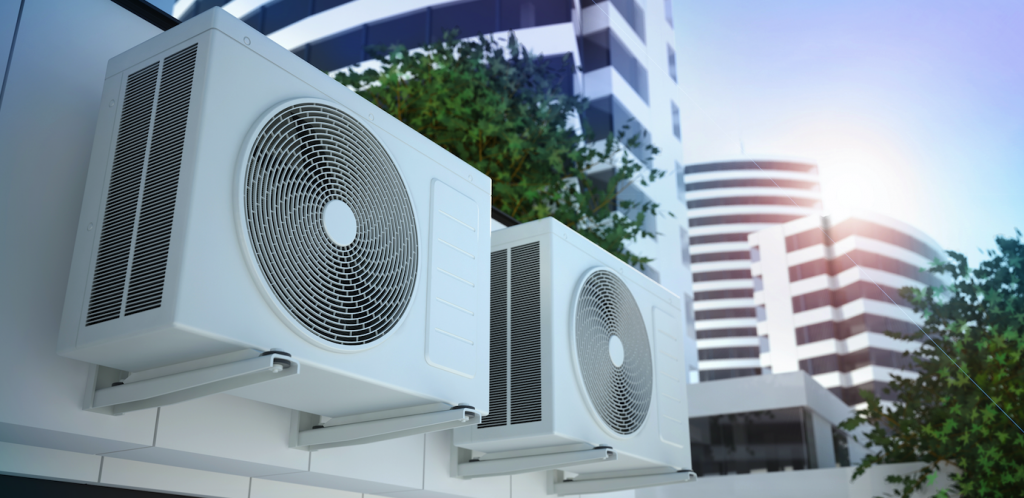
While it is difficult to control the emission of refrigerants into the atmosphere due to the range of HVAC systems in use today, advancements in technology have the potential to reduce their environmental impact. If you want to become a HVAC technician, you’ll probably become familiar with R-32 as a possible solution. R-32, or difluoromethane, is an HFC refrigerant known to have a lower impact on greenhouse gas emission than R-410A, and is being explored by HVAC engineers as an option to reduce the environmental impact of HVAC systems. It has been found that R-32 can even be used to make these systems more energy efficient, as it has better thermodynamic properties. In the future, developments in the use of alternative refrigerants such as R-32 have the potential to reduce the amount of greenhouse gases in the atmosphere as a result of HVAC systems.
HVAC Systems Use Energy
It’s important to be aware that HVAC systems consume high amounts of energy. Depending on the type of system and the season, an air conditioning system can consume around 3000 to 5000 watts of electricity every hour. Electricity consumption results in the burning of fossil fuels and the release of carbon dioxide into the atmosphere, a major cause of ozone layer depletion. One way to determine how much energy an air conditioning system is using is by checking its SEER rating. Older air conditioners have lower SEER ratings and tend to consume more energy.
As a way to reduce the amount of fossil fuels released, HVAC products that harness renewable energy sources are also becoming a more popular option. Renewable energy sources such as solar and geothermal energy can reduce the environmental impact of HVAC systems by using sources of power that don’t burn fossil fuels. Solar energy harnesses energy from sunlight rather than from fossil fuels to power HVAC systems, while geothermal heat pumps convert natural energy stored underground for use.
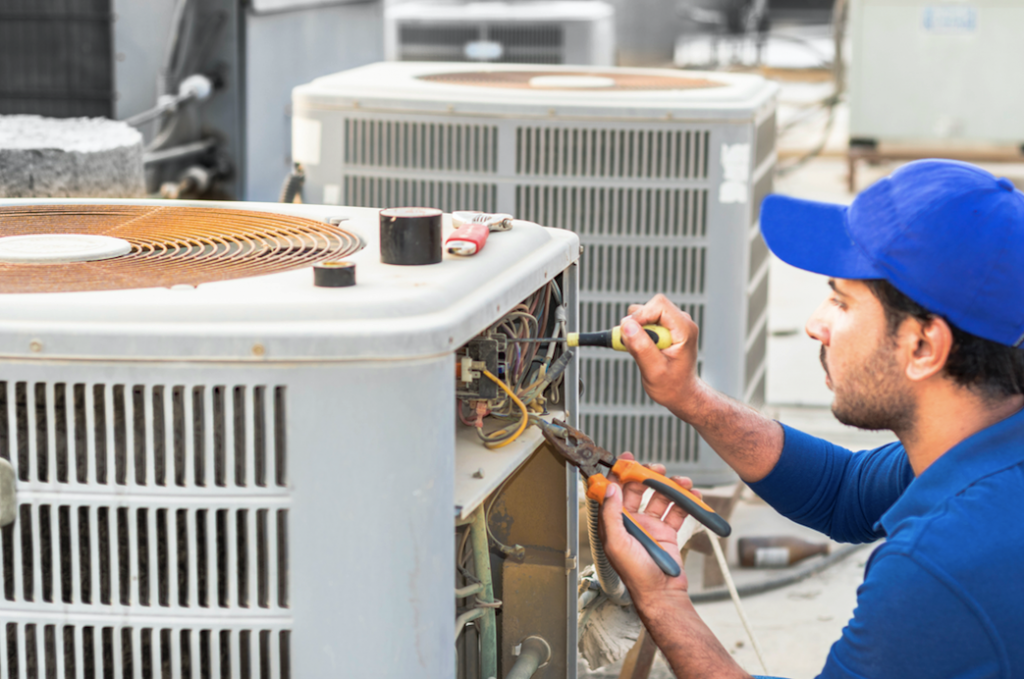
Small-Scale Solutions to Reduce the Environmental Impact of HVAC Systems
The environmental impact of HVAC systems can be reduced on a small scale, and as a professional in an HVAC career, this is an area where your services are especially useful to clients looking to reduce their own personal energy consumption and greenhouse gas emissions. The efficiency of an HVAC system depends on the equipment being used. If a system’s equipment is outdated, chances are it’s using more energy or emitting a greater quantity of harmful refrigerants. Advising environmentally-conscious clients to replace old HVAC systems with an updated, energy efficient system can reduce the negative impact of older units.
Additionally, HVAC systems should be regularly maintained in order to prevent excess emissions. Air filters should be replaced regularly, ducts and pipes should be inspected for leaks, and valves and steam traps should be examined for efficiency.
If you want to be equipped with the ability to make HVAC systems less harmful for the environment, a program at the North American Trade Schools (NATS) could be right for you. Jason, a graduate of the North American Trade Schools HVAC technician program, says he chose NATS because of its reputation as a “hands-on school.” He notes, “They teach you what you need to know and then you apply your knowledge.” Practical, experiential training enables HVAC technicians to apply their newly learned skills in the field in innovative ways. That includes approaches that may help to reduce the environmental impact of HVAC systems.
Are you interested in attending HVAC school?
The North American Trade Schools program could be right for you!
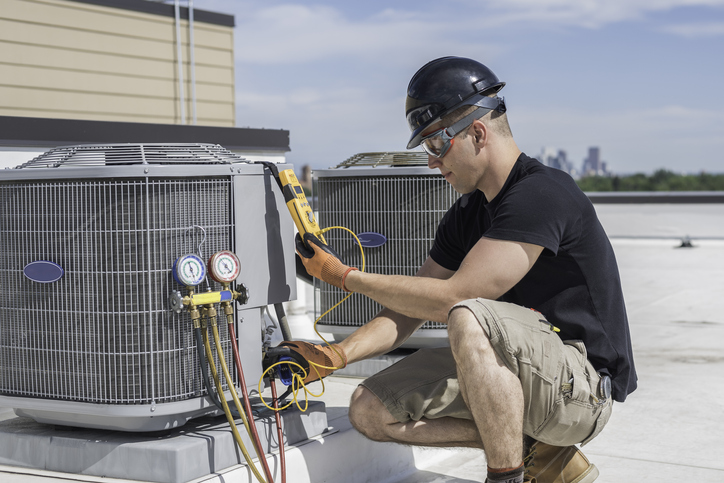
If you value doing a variety of work and are good with hands-on tasks, then chances are that a career in heating, ventilation, and air conditioning (HVAC) could be a great fit for you. HVAC technicians are quick problem-solvers, possessing a solid understanding of mechanical systems and how best to install and repair them. They are relied on whenever the heating dies off or the air conditioner breaks down—and practically every modern building uses either, if not all, of these systems.
Becoming an HVAC technician has many benefits, including the rewarding feeling of a job well done. Here are some reasons why becoming an HVAC technician might be a good idea for you!
Technicians Benefit of Short Training and Fast Results
Starting your HVAC training is key for your success as an HVAC professional. And, unlike lengthy university programs that can take four years to complete, pre-apprenticeship training can be completed in significantly less time.
Pre-apprenticeship training also includes plenty of hands-on work, rather than just sitting through long class lectures. As Jason Boyer, HVAC student at NATS, puts it, “I chose North American Trade Schools because it’s a hands-on school.” He adds, “They have the experience, they have the know-how, and you take what you can from them and apply it to your trade.”
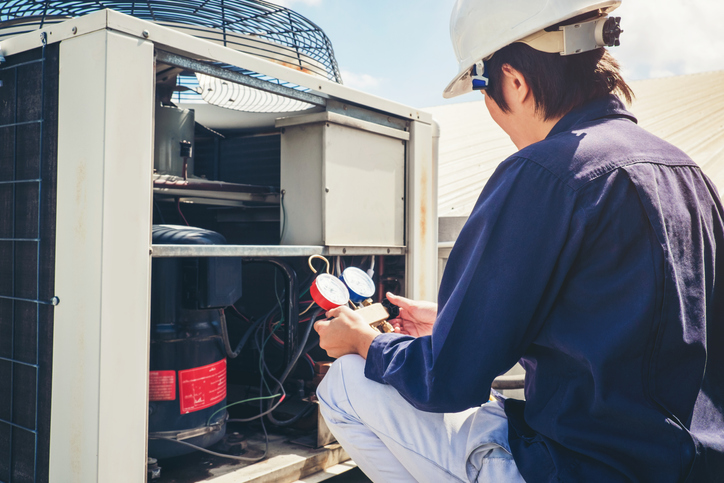
HVAC Careers Include a Variety of Work and Opportunities to Advance
Every day on the job offers the chance to do something new—working in both indoor and outdoor settings while meeting all kinds of different people. This means you’ll have plenty of opportunities to stay active on the job. Each task will contain different challenges for you to overcome, turning every service call into an opportunity for a change of pace. It’s anything but your typical 9-5 office job!
HVAC is a diverse field, offering a variety of work for its professionals. Technicians work with a variety of heating and air conditioning systems, having been trained to install and maintain gas and propane heating systems and ventilation as well as air cooling equipment in residential and light commercial environments. As a result, technicians have room to advance their careers after years of training and earning specialized certifications.
HVAC Is a Highly Valued Service That Comes with Many Rewards
Contrary to what some might think, HVAC work is not seasonal—no matter the time of year, people often need help with their HVAC systems. Due to the nature of the work, technicians need a solid level of mechanical skill and technical ability. HVAC technicians are effective problem-solvers. They have to analyze entire HVAC systems to root out key causes of failure before knowing how to make the necessary repairs. Because the work they do is hands-on, they also get the satisfaction of seeing the concrete results of their actions after a job well done.

An HVAC career is service-oriented, leaving plenty of room for customer satisfaction. Technicians are often met with gratitude as they work to provide valuable service, keeping temperatures well-regulated in all kinds of environments—ultimately providing comfort and security for their clients.
Are you interested in attending an HVAC college?
Contact NATS for more information!

There’s no doubt that the trades are an excellent path for individuals looking for a stimulating and reliable career that allows them to work with their hands and make a good income. If you’ve already determined that you want to work in the trades, the next step is to determine which particular trades career is ideal for you, so you can enroll in the right program at trades school!
There are plenty of exciting options available in the trades, from becoming a carpenter or cabinet maker to starting an electrician or HVAC career. Curious to learn more? Read our infographic below for an introduction to promising trades careers, so you can determine which career is right for you!
Which Trades Career Is Right for You?
Become an HVAC Technician!
What do they do?
- Install, service, and repair HVAC systems in commercial and residential buildings
Typical workplaces
- Private contracting companies
- Engineering firms
- Municipalities
- Residential services companies
Reap these benefits of an HVAC Career
- Canadian weather requires heating and cooling year-round, creating plenty of need for HVAC!
- Above average job growth expected in Ontario
Start a Hands-on Career as a Welder
What do they do?
- Install, maintain, and repair structural and piping systems in a variety of environments
- Weld together piping and metals
Typical workplaces
- Manufacturing organizations
- Residential service companies
- Private contracting companies
- Engineering firms
Unique perks of becoming a Welder
- A new challenge every day with a career that lets you work with your hands
- A variety of job opportunities available across many sectors
Launch an Eco-Friendly Career as a Solar Energy Technician
What do they do?
- Help to install, maintain, and troubleshoot solar energy systems
Typical workplaces
- Contracting companies
- Energy consultant companies
- Solar energy organizations
- Energy services organizations
Tempting perks of a solar energy career
- Work towards creating a more sustainable environment
- The renewable energy industry is booming in Canada
- 66% of Canada’s energy is from renewable sources
Put Your Hands to Work with a Cabinetmaking Career
What do they do?
- Transform wood into furniture and finishings such as trim and kitchen cupboards
Typical workplaces
- Millwork companies
- Furniture manufacturers
- Construction companies
Exciting benefits of a carpentry career
- Above average outlook for job growth in Ontario
- You can start your own business
- 34% of carpenters in Ontario are self-employed
Transform Homes as a Home Renovation Technician
What do they do?
- Work with clients to transform their homes
- Paint, add additions, and install windows, doors, flooring, and more
Typical workplaces
- Home restoration companies
- Residential renovation organizations
- Roofing companies
- Construction companies
Enjoy these perks of becoming a Home Renovation Technician
- Above average employment growth in Ontario
- Ability to work for yourself
- 68% of renovators are self-employed
Jumpstart a Lucrative Career as a Construction & Maintenance Electrician!
What do they do?
- Service, inspect, and test electrical systems
- Diagnose problems with electrical networks
Typical workplaces
- Electrical contracting companies
- Commercial and residential construction companies
- Government companies
Benefits of becoming a Construction & Maintenance Electrician
- Lucrative salary
- Above average job growth in Ontario
- 67% of workers work full-time
Sources:
https://www.app.tcu.gov.on.ca/eng/labourmarket/ojf/findoccupation.asp

HVAC technicians are required to have a complex skill set to address different tasks. Every day might provide different challenges, from identifying maintenance risks to diagnosing electrical and mechanical faults to cleaning a system or doing warranty service. Whether you work in a commercial or residential setting, customer service skills also play a big role in your success.
Skilled trades people trained in HVAC are in demand and many employers stress the importance of customer service skills. While it helps if you already have some experience with customers, these so-called soft skills can be learned. With practice and guidance, you will quickly see the variety of reasons these skills are important. Here are a few ideas to get you started.
Short Term Comfort Guarantees Long Term Comfort
If you work in a residential setting you know, of course, that you’re working in someone’s house. Ultimately, you are contributing to their overall comfort of their home. Installing or maintaining an air-conditioner when it’s hot or making sure a furnace runs all winter is the main job in making people feel comfortable. However, the customer’s comfort while you’re actually in their home is just as important.
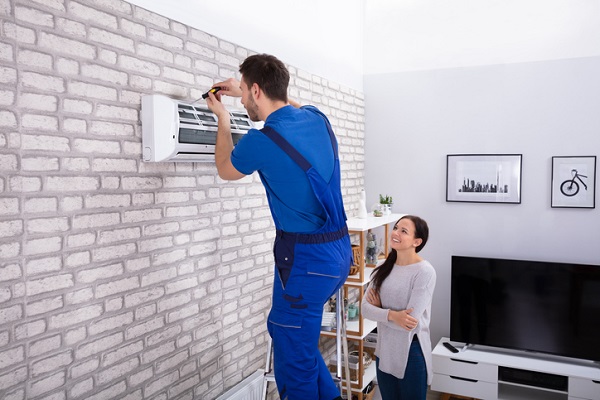
An experienced technician who has already had a long HVAC career will say that being friendly and communicative means that they get called back. A customer that feels at ease while you work is also more likely to recommend you to others, which will only help you in the long run.
Customer Trust Adds Value to HVAC Training
There are a number of ways in which you can build trust with a customer after your HVAC training. For example, it can be helpful to explain the work you are doing, give updates, and leave room for customers to ask questions. These types of exchanges add value to your work because a customer will have a better understanding of your job and see that you know what you’re talking about.
When you break down what you do in everyday language and recommend preventative maintenance it also demonstrates to a customer that your goal is to have a system that will not need extra, costly repairs. Of course, if their system does need more attention in the future, they will have confidence that your return will be worth it.
Sensitivity Gives Everyone Options
While there is a lot of joy involved in installing, repairing and maintaining the systems that people rely on every day, you sometimes have to deliver bad news. When you go out on a call because a furnace doesn’t seem to be working or the AC has stopped, your job may be to tell people they must do an expensive repair or replacement. The way a technician delivers this news must be sensitive to the situation and show understanding.

Again, communication skills come into play. Whatever the situation might be, it is important that you be able to explain a customer’s options clearly. Sensitivity to different levels of technical understanding as well as sensitivity to financial impact will keep you and your HVAC business as an option for more customers in the future.
Want to start your career?
North American Trade School has the courses for your HVAC diploma!
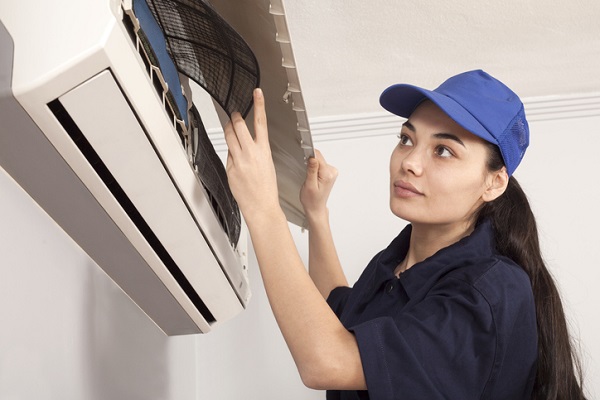
In HVAC training you will learn about fasteners, tools, codes and regulations as well as other knowledge and skills that are required for the job. However, one skill that you should not overlook is time management. If you’re looking to break into the HVAC industry, managing your time effectively can help you succeed.
Time management skills allow you to stay on track and are the best way to prepare for unexpected circumstances. Managing your time effectively also keeps you calm and reduces your stress, so that you are able to work in a focused, effective manner. Read on for more about why time management will matter in your career in the HVAC industry!
Your HVAC Career Will Be Full of Surprises
A major benefit of managing time effectively is that it helps you account for unexpected emergencies, calls and problems. In a job where you are servicing equipment and appliances, you may be called in for an issue and arrive only to discover that the problem is larger than you originally assumed it would be. This adds time to your task and delays the rest of your schedule.
If you’ve organized your day to allow for last-minute changes or service calls that run longer than expected, you’ve given yourself plenty of extra time so that you can still complete your day’s schedule. That way, if you find yourself in a situation where you need to pick up a part or change your strategy, you’ll have enough wiggle room to do so.
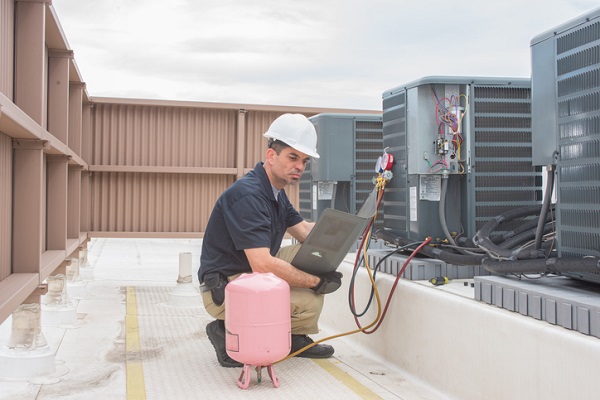
Time Management Helps You Save on Travel
When you are working in an HVAC career, throughout your day you may be required to travel to multiple locations that are quite dispersed. The more time you spend on the road, the less you can get done. This may cause your schedule to run behind or may not be an economical use of resources such as fuel. If you’re working with a team, failing to coordinate locations can cause unnecessary travel amongst employees.
Learning how to plan days in a way that makes sense for travel helps you manage your schedule. Establishing the most direct routes between locations is also helpful to save on time and costs, while ensuring that all of your goals for the day are accomplished.
Time Management Keeps Your Stress Levels Down After HVAC College
When tasks go unfinished or jobs are rushed, the quality of your work isn’t something you are likely to be proud of. This can cause your stress levels to rise and reduce your job satisfaction. After you have your HVAC diploma, you will want to show your skills and knowledge and perform to the best of your abilities. Making sure you have enough time and planning to finish what you’ve started helps you stay focused and healthy for a long and rewarding career. This also keeps you from constantly feeling time pressure or fearing that you won’t finish your work, which is another major stressor.
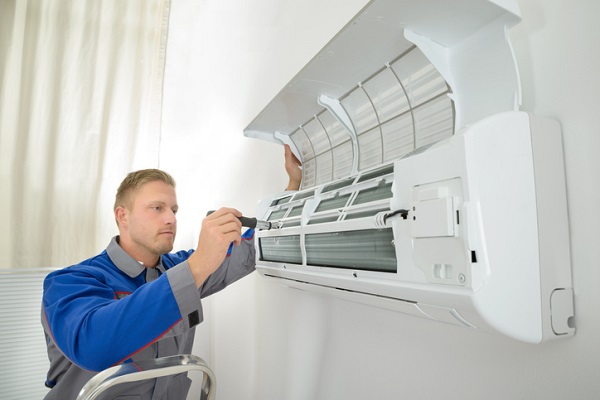
Scheduling extra blocks in your schedule allows you to thoroughly inspect situations and consider solutions, rather than applying quick fixes that won’t last as long. Not only will this help you stay focused and calm, it will make you a more successful professional because your work will be top-notch.
Are you interested in studying at HVAC college?
Contact North American Trade Schools to find out more!

Have you been thinking about pursuing a new career? Perhaps you’re stuck in a rut at your current job or you’re just out of school and looking at potential career paths. Whatever your reasons, pursuing a career as an HVAC technician could be an excellent choice for you.
HVAC technicians are in demand in Ontario. Here, population and economic growth is leading to lots of new construction of both residential and commercial buildings. That means if you become an HVAC technician, you have opportunities to work in a wide variety of exciting settings in Ontario.
If you’re wondering about whether you’re the right fit for an HVAC career, there are fortunately a few ways to find out. HVAC technicians are hands-on people. They love working with machines, solving problems, and they certainly aren’t afraid of getting a little dirty from time to time. Plus, many HVAC technicians love the satisfaction of knowing they’re helping to keep people comfortable and safe.
Check out this useful infographic for signs that becoming an HVAC technician may be for you!
Signs You’re Ready to Become an HVAC Technician
Are You a Hands-On Problem Solver?
HVAC technicians love working with machines
They’re not afraid to get their hands dirty
Sometimes they’ll work outside
Other times they may find themselves in cramped spaces
They diagnose problems and get them fixed
Are You Feeling a Bit Bored in Your Current Job?
Being an HVAC technician is not like a regular 9 to 5 office job
You’ll get to tackle new challenges every day, such as:
- Troubleshooting problems
- Installing new HVAC systems
- Performing routine maintenance
- Inspecting systems
- Communicating with customers
- Testing parts and equipment
You’ll travel to different worksites, like:
- Homes
- Shops
- Factories
- Offices
- Hospitals
- Anywhere with heating, ventilation, or air conditioning!
Are You Looking to Make a Difference?
People depend on HVAC technicians to keep buildings:
- Cool in the summer
- Warm in the winter
- Well-ventilated year-round
HVAC technicians do more than just help people stay comfortable
They also keep them safe:
- Nursing homes need HVAC to protect residents on cold or hot days
- Restaurant kitchens rely on HVAC to stay well-ventilated for safety
- Hospitals need HVAC to reduce infections and keep patients safe
- Workplaces rely on HVAC to avoid dangerous working conditions
Do You Want a Successful Career?
In Ontario, there is currently a shortage of HVAC technicians
The demand for HVAC technicians is very strong
94% of HVAC technician work full-time, compared with 79% for all other jobs
Strong demand means HVAC technicians are paid well:
The average salary for an HVAC technician is $51,675
Experienced technicians make up to $87,500!
Sources:
https://www.jobbank.gc.ca/marketreport/outlook-occupation/7533/ON







